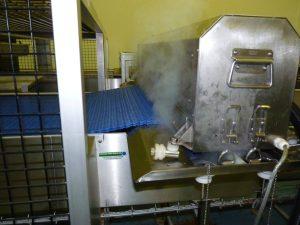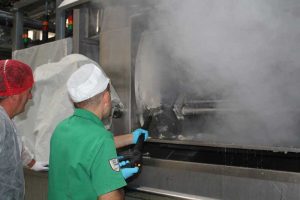In the bustling world of industrial operations, conveyor belts serve as the lifeblood of productivity, transporting materials with remarkable efficiency. However, the very nature of their function means that they are prone to accumulating debris, dust, and other contaminants that can hinder their performance. This is where conveyor belt cleaners come into play.
These essential tools are designed to maintain the cleanliness of conveyor belts, ensuring that they operate smoothly and efficiently. By removing unwanted materials from the belt surface, these cleaners not only enhance the longevity of the equipment but also contribute to a safer working environment. The significance of conveyor belt cleaners cannot be overstated.
They are integral to various industries, including mining, manufacturing, and food processing, where the integrity of the product being transported is paramount. A clean conveyor belt is crucial for maintaining product quality and preventing contamination. As industries evolve and demand for efficiency increases, the role of conveyor belt cleaners becomes even more critical.
This article delves into the importance of efficient conveyor belt cleaning, exploring the various types of cleaners available, their advantages, and factors to consider when selecting the right cleaner for specific applications.
Summary
- Conveyor belt cleaners are essential for maintaining the efficiency and productivity of conveyor systems in various industries.
- Efficient conveyor belt cleaning is important for preventing material carryback, reducing maintenance costs, and improving overall conveyor performance.
- There are different types of conveyor belt cleaners available, including primary, secondary, and tertiary cleaners, as well as specialty cleaners for specific applications.
- Using efficient conveyor belt cleaners can lead to advantages such as increased productivity, reduced downtime, and improved workplace safety.
- When choosing a conveyor belt cleaner, factors to consider include the type of material being conveyed, belt speed, belt width, and the specific cleaning requirements of the application.
Importance of Efficient Conveyor Belt Cleaning
The importance of efficient conveyor belt cleaning extends beyond mere aesthetics; it is a fundamental aspect of operational efficiency and safety. When a conveyor belt is laden with material build-up, it can lead to a host of problems, including reduced throughput, increased wear and tear on the equipment, and even potential safety hazards for workers. Contaminants can cause products to become damaged or contaminated, leading to costly recalls and loss of consumer trust.
Therefore, maintaining a clean conveyor belt is not just about keeping things tidy; it is about safeguarding the entire production process. Moreover, efficient cleaning practices can significantly reduce maintenance costs over time. When belts are regularly cleaned and maintained, they are less likely to suffer from premature wear or damage.
This translates into fewer breakdowns and repairs, allowing companies to allocate resources more effectively. In an era where operational efficiency is paramount, investing in effective conveyor belt cleaning solutions is a strategic move that can yield substantial returns in terms of productivity and cost savings.
Types of Conveyor Belt Cleaners

Conveyor belt cleaners come in various forms, each designed to tackle specific cleaning challenges. The most common types include primary cleaners, secondary cleaners, and specialty cleaners. Primary cleaners are typically installed at the discharge point of the conveyor system and are responsible for removing bulk material that adheres to the belt.
These cleaners often feature robust blades made from durable materials that can withstand harsh conditions while effectively scraping off debris. Secondary cleaners, on the other hand, are positioned further along the conveyor system and focus on removing any residual material that may have escaped the primary cleaner’s grasp. These cleaners are often equipped with more delicate blades designed to ensure a thorough clean without damaging the belt surface.
Specialty cleaners cater to unique requirements, such as those found in food processing or pharmaceutical industries where hygiene standards are exceptionally high. These cleaners may incorporate advanced materials and designs to ensure compliance with stringent regulations.
Advantages of Using Efficient Conveyor Belt Cleaners
| Advantages | Description |
|---|---|
| Improved Efficiency | Efficient conveyor belt cleaners help in maintaining a clean belt surface, reducing material carryback and spillage, leading to improved overall conveyor efficiency. |
| Extended Belt Life | By reducing the wear and tear caused by carryback and spillage, efficient cleaners can help in extending the life of the conveyor belt. |
| Reduced Maintenance Costs | Less carryback and spillage means less maintenance and cleaning required for the conveyor system, resulting in cost savings. |
| Improved Workplace Safety | By reducing spillage and carryback, efficient cleaners contribute to a safer working environment for personnel around the conveyor system. |
The advantages of employing efficient conveyor belt cleaners are manifold. Firstly, they enhance operational efficiency by ensuring that belts remain free from obstructions that could impede material flow. This leads to increased throughput and reduced downtime, allowing businesses to maximise their productivity levels.
Furthermore, a clean conveyor belt reduces the risk of equipment failure caused by excessive wear and tear, ultimately extending the lifespan of the machinery. In addition to operational benefits, efficient conveyor belt cleaners also contribute to improved workplace safety. By minimising the risk of spills and accidents caused by material build-up, these cleaners create a safer environment for employees.
This is particularly important in industries where heavy machinery is in use or where hazardous materials are being transported. Moreover, maintaining a clean working environment can boost employee morale and productivity, as workers are more likely to feel motivated in a tidy and organised space.
Factors to Consider When Choosing a Conveyor Belt Cleaner
Selecting the right conveyor belt cleaner requires careful consideration of several factors. One of the most critical aspects is the type of material being transported on the conveyor belt. Different materials may require specific cleaning solutions to ensure effective removal without damaging the belt itself.
For instance, abrasive materials may necessitate more robust cleaning systems compared to lighter products. Another important factor is the operating environment. Conveyor systems in harsh conditions—such as those exposed to extreme temperatures or corrosive substances—may require specialised cleaners designed to withstand such challenges.
Additionally, the size and speed of the conveyor system should be taken into account; larger or faster systems may necessitate more powerful cleaning solutions to keep pace with operational demands. Ultimately, understanding these factors will enable businesses to make informed decisions when selecting conveyor belt cleaners that best suit their needs.
Installation and Maintenance of Efficient Conveyor Belt Cleaners

The installation and maintenance of conveyor belt cleaners are crucial steps in ensuring their effectiveness over time. Proper installation involves positioning the cleaners at optimal locations along the conveyor system to maximise their cleaning capabilities. This may require adjustments based on the specific layout and operational requirements of the facility.
It is essential that installation is carried out by trained professionals who understand the intricacies of conveyor systems to avoid any potential issues down the line. Once installed, regular maintenance is vital for keeping conveyor belt cleaners in peak condition. This includes routine inspections to check for wear and tear on blades and other components, as well as cleaning any accumulated debris from the cleaner itself.
Implementing a proactive maintenance schedule can prevent unexpected breakdowns and ensure that cleaning systems operate at their best efficiency. By prioritising both installation and maintenance, businesses can significantly enhance their conveyor belt cleaning processes.
Case Studies of Improved Productivity with Efficient Conveyor Belt Cleaners
Numerous case studies illustrate how efficient conveyor belt cleaners have led to remarkable improvements in productivity across various industries. For instance, a mining company faced significant challenges with material build-up on their conveyor belts, leading to frequent downtime for cleaning and maintenance. After implementing a state-of-the-art primary cleaner system, they reported a 30% increase in throughput within just a few months.
The reduction in downtime allowed them to allocate resources more effectively and ultimately boosted their bottom line. Similarly, in the food processing sector, a manufacturer struggled with contamination issues due to inadequate cleaning practices on their conveyor belts. By investing in specialised food-grade cleaners that met stringent hygiene standards, they not only improved product quality but also reduced waste significantly.
The result was a marked increase in customer satisfaction and a stronger reputation within the industry. These case studies highlight how investing in efficient conveyor belt cleaning solutions can yield tangible benefits in terms of productivity and overall operational success.
Conclusion and Future Trends in Conveyor Belt Cleaning Technology
In conclusion, efficient conveyor belt cleaning is an indispensable aspect of modern industrial operations. As industries continue to evolve and face new challenges, the importance of maintaining clean conveyor systems will only grow. The advancements in cleaning technology promise exciting developments on the horizon—ranging from automated cleaning systems that utilise sensors for real-time monitoring to eco-friendly cleaning solutions that minimise environmental impact.
As we look towards the future, it is clear that businesses must remain proactive in adopting innovative cleaning technologies to stay competitive in an increasingly demanding market. By prioritising efficient conveyor belt cleaning practices today, companies can pave the way for enhanced productivity and sustainability tomorrow. The journey towards cleaner operations is not just about maintaining equipment; it is about fostering a culture of excellence that resonates throughout every facet of an organisation’s operations.
FAQs
What is a conveyor belt cleaner?
A conveyor belt cleaner is a device used to remove material adhering to the surface of a conveyor belt. It is essential for maintaining the efficiency and longevity of the conveyor system.
Why is a conveyor belt cleaner important?
A conveyor belt cleaner is important because it helps to prevent material buildup on the belt, which can lead to increased wear and tear, reduced efficiency, and potential damage to the conveyor system.
How does a conveyor belt cleaner work?
A conveyor belt cleaner typically uses a scraping or brushing mechanism to remove material from the surface of the conveyor belt as it moves along the system. This helps to keep the belt clean and free from debris.
What are the different types of conveyor belt cleaners?
There are various types of conveyor belt cleaners, including primary cleaners, secondary cleaners, and specialty cleaners designed for specific applications. Primary cleaners are typically located at the head pulley and are the first line of defense against material buildup, while secondary cleaners are positioned further along the belt to provide additional cleaning.
What are the benefits of using a conveyor belt cleaner?
Using a conveyor belt cleaner can help to improve the efficiency and reliability of a conveyor system, reduce maintenance and downtime, and extend the lifespan of the conveyor belt.
How do I choose the right conveyor belt cleaner for my application?
When choosing a conveyor belt cleaner, it is important to consider factors such as the type and size of material being conveyed, the speed and load capacity of the conveyor system, and any specific environmental or operational challenges that may affect the cleaning process. Consulting with a professional supplier or manufacturer can help in selecting the most suitable conveyor belt cleaner for your specific application.










